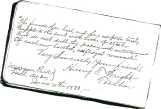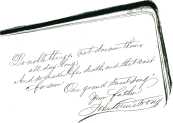 |
Home | Search | Browse | About IPO | Staff | Links |
 |
Home | Search | Browse | About IPO | Staff | Links |
 Percy's autograph book Military student's keepsake opens window to the past  By Barn Kritzberg Percy W. Armstrong was diligent and persistent about collecting autographs. He did not stop until his leather-bound Paragon Autograph Album had slightly more than 100 signatures, usually one per page, with hardly a single page left blank. His mother, father, brothers and sister all signed it, as did Uncle Charles. Percy wrote his own name in his auto-graph book three times. Perhaps it was vanity or penmanship practice, or simply an expression of pride of ownership. But the vast majority of the autographs were gathered from his teachers and classmates while Percy was a student at Morgan Park Military Academy from 1879 to 1882.
Not everyone who signed the book included a date, but there are enough dated entries to show us that Percy collected more than half his signatures in 1880, about a quarter in 1881, but only a handful in 1882. The proud possession of 1880 became, like the neglected Christmas toy, something Percy resorted to only occasionally. Most of the 1880 signatures were recorded in June, suggesting the autograph book was a present for the successful completion of that year at MPMA. In his son's autograph book, John Armstrong quoted inspirational lines from Charles Kingsley's "A Farewell" to put Percy on the right track: Do noble things, not dream them, till (Armstrong omitted the preceding line, which cast the verse in a decidedly different light: "Be good sweet maid, and let who will be clever.") Percy's father was one of a dozen or so parents who offered a testimonial about his satisfaction with the school in the Annual Catalogue of the Morgan Park Military Academy for 1880-1881. "At the close of another year's training of my son in your Academy," Amstrong wrote, "it gives me pleasure to express my approval of his [Percy's] excellent progress in study and deportment; and to reiterate my former testimony to the merit of your school as being, in my opinion, a home where boys receive the very best moral, intellectual, and physical culture." Percy's sister, Jennie E., offered these (perhaps not original) words of wisdom: Percy's mother, Mrs. W. R. Armstrong, and his brother, William, signed and dated (June 23, 1880) their entries, indicating they were in Arcola (presumably home, since it was after the school term). Another brother, John, did not get around to signing Percy's book until July. None of the other family members had any pearls of wisdom to offer Percy. Edward Kirk Talcott, commandant, associate principal, and teacher of English and military tactics at MPMA, honored Percy by signing one of the early pages. "A merry heart doeth good like medicine," Talcott wrote, quoting another source, and signing it with his full title: "Capt. & Cmdt. Morgan Park Cadets." T.V. Thompson, instructor in English studies and Greek and Latin languages, quoted a bit of wisdom about wisdom for Percy to ponder: "Wisdom is oftentimes nearer when we stoop than when we soar." Another lofty sentiment was offered by Henry T. Wright, associate principal and instructor in mathematics, reading, and elocution, for Percy's benefit: The friends thou hast, and thus adoptive tried, Wright graduated from Beloit College in 1866 and, according to an 1876 testimonial provided by A.L. Chapin, president of the college, ranked "among the first scholars in his class." The moral tone at MPMA was Illinois Heritage 17 lofty, but not every moment was solemn. Mrs. Henry T. Wright, who taught vocal and instrumental music and painting at the Academy, used the page opposite her husband's entry to deflate his high seriousness. "Percy," she wrote, "I am astonished at the great outburst from our next neighbor. But we must forgive him, as it would be very difficult [for him] to come down into the region of the little people, such as you and I and the 'baby' for instance. By the way: This baby of ours is a wonderful thing "But then Percy I don't forget my boys," she continued, "but shall gladly share the love, and wish them all the good that may come to them. Trusting that you may have a bountiful share..." Percy must have been glad to have the likes of the charming Mrs. Wright at MPMA. The students who signed Percy's book sometimes expressed friendship, offered platitudes, and some recorded cryptic notions that hint at things that will probably never be known. J. Calvin Johnson of Princeton, echoed a high moral tone that was more typical of adults. "In your friendships," Johnson wrote, "make choice of the best." Most students, however, were content to record sentiments borrowed from the commonplace books of the day. "In the golden chain of friendship regard me as a link," James Stettaner wrote.
M.G. Klein, of East St. Louis noted: "Among the many friends who claim a kind remembrance in thy heart I too would add my simple name among the rest." There is a passage in Latin, a quote from Cicero, taken, no doubt, directly from a text book; there is a rryptic pseudo-Latin message for Percy, concealing perhaps some shared misdemeanor; and there is one passage where the penmanship is such that one can not tell whether it is Latin, Italian, or French. The most interesting comments, however, were the hints from students that the military discipline had not altogether effaced all traces of adolescence. Willie Clarke, of Geneseo, signed his name with a fine, large flourish, but what he wrote in much smaller script in the upper corners is far more intriguing. "Broken windows," he noted in the left margin, and "off limits " in the right. One wonders what those mischievous boys had been about.  
Brainard Smith, of Springfield, reminded Percy that "T.V.T. [English instructor Thompson] says to study Latin one hour." He then added a bit of verse that probably did not come out of a commonplace book: How we long to be free And far away From T.V.T. And the old M.P.M.A. Eddie Friedmann, of Milwaukee, Wisconsin, also used the upper corners for more intimate communication. "One day nearer home," he wrote, suggesting that in June, home was on most of the boys' minds. In the right corner, he added, "hold out your hand," alluding possibly to the standard punishment for some infraction. Expressions recorded at the margins on other pages hint at equally dubious activities: "loss of blood...furnace... getting up before reveille...tree and dogs.. .bread and water. Several referred to themselves as "prisoners" or "convicts," suggesting that students have always regarded schools in such light. It was clear, too, from at least one entry that the autograph book might have been circulated under the very noses of the diligent schoolmasters. Arthur G. Bennett, of Ravenswood, wrote that he would "pass it to Black next." But the most tantalizing entries were made by women. Antoinette Wright (a relation, perhaps, of Henry T. Wright), who wrote "yours always" in Percy's book, must have wanted to see him again, for she gave not one, but two addresses where she might be found. Was it the beginning of a youthful romance? How did young Percy come in contact with a woman with two Chicago addresses? Bessie N. Harlow's entry was of the commo place book variety ("I would that my signature could guarantee the fulfillment of my wish-Good health and prosperity to you"), but it is the time (December 12, 1904) and place (New Zealand) that I are the puzzle here. Did Percy carry around that autograph book for a quarter of a century? Was it Percys whim, or Bessie's joke? (Continued on Page 21) Illinois Heritage 18 Those questions, of course, can't be answered. But it is possbile to provide a kind of happy ending to the story of Percy's Paragon Autograph Album. Added to the autograph bood, on a loose sheet of paper, was a note written by his wiffe(obviously much later): "Percy Armstrong won the gold scholarship medal in 1881 and was made sergeant." Barry Kritzberg, archivist at Morgan Park Academy, is writing a history of the school. |
|
|